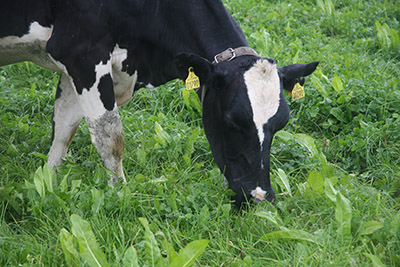
The Organic Research Centre in Newbury, Berkshire was a lead research partner in a major pan-European project that has culminated in the development of ground-breaking research and advice to help make the organic and low-input dairy sector more sustainable and competitive.
In working with farmers and other stakeholders, methods were developed to identify opportunities and novel strategies to enhance profitability, such as changes in breeding, health management and feeding strategies, and provide support systems for on-farm use.
The five year Sustainable Organic and Low-Input Dairying (SOLID) project* funded by the European Commission, involved agro-scientists and farming experts from 25 institutions around Europe. The research highlights that although ‘one size does not fit all’ in the organic and low put dairying industry, the results are providing innovative solutions to enhance the sustainability and competitiveness of the industry.
Significantly, the project indicates that organic farmers are open to change and innovation in order to achieve higher levels of sustainability.
As well as developing a comprehensive website, including a Farmer Handbook** and summaries of the research findings aimed at farmers, advisers and policy makers, the project has also generated a series of published research papers.
Dr Susanne Padel from the Organic Research Centre and a named co-author of published research from SOLID, said, “This project has come at a time when society is demanding high quality milk in tandem with higher welfare standards and environment protection. Our research clearly shows that natural resource management offers a positive way forward to increase competitiveness and sustainability for organic and low input dairy farming and also has huge potential for conventional dairy farming too.”
Working collaboratively with farmers in on-farm trials in the UK, SOLID-scientists showed that rotational, intensively stocked grazing of biodiverse pastures containing a mixture of legumes, grasses and herbs can maintain animal productivity at high levels.
Studies by the Organic Research Centre also showed that the integration of animals (cows) with trees in the same plot of land could provide benefits in terms of shelter for livestock and increase total productivity. In on-farm projects in the UK and Denmark by the Organic Research Centre’s researchers strategies were investigated to supporting animal health and welfare as well as reducing antibiotic use on farms. These included farmer group discussions that emerged into on farm trials investigating the usefulness of alternatives to antibiotic use in addition to farm management practices, such as letting calves suckle their mothers for at least one month after calving in order to promote animal welfare.
The research also provided valuable insights on how to decrease the negative environment impacts of dairy farming practices particularly reducing greenhouse gas emissions and nitrogen and phosphorus losses through carbon sequestration. Another key element of the SOLID project was to compare commonly used breeds with breeds perceived by farmers as ‘better adapted’ to specific environmental conditions within and across countries and regions, which allows for the selection of animals that are more suitable for individual herds or farms.
The use of home-grown protein crops such as clover rich pastures, as well as lupins, beans and peas as animal feed was found to reduce the amount of imported soya from outside the EU and therefore can help to reduce costs and improve soil fertility.
The researchers analysed the supply chain from farm to fork and worked with socio-economic modelling to predict the impact of more widespread adoption of low-input practices.
Dr Padel explains the practical implications of the results for farmers, “As our SOLID research clearly demonstrates, in times of increased economic pressure for dairy farming there are opportunities for low cost and or tailored organic practices as alternative and profitable forms of milk production. However, the research does highlight the importance of good dairy-herd management practices that are adapted to specific circumstances and that good collaboration throughout the supply chain is paramount.”
For further information on the results and wide-ranging advice emanating from the SOLID project, including E-learning tools, please visit: http://farmadvice.solidairy.eu/ or https://tinyurl.com/SOLID-ORC
For further information on this press release, please contact: Morag Walker on 07736 124097 or email: morag@moragwalkerpr.co.uk.
The Organic Research Centre (ORC): established in 1980, is the UK’s leading independent research centre for the development of organic/agroecological food production and land management solutions to key global issues including climate change, soil and biodiversity conservation, and food security. www.organicresearchcentre.com
Further information on the work of the Organic Research Centre can be obtained from Dr Susanne Padel on email: Susanne.p@organicresearchcentre.com or telephone: 01488 658298
*Sustainable Organic and Low Input Dairying (SOLID) project: The five-year (2011 – 2016) SOLID project, funded by the European Commission, involved 25 partners across 10 European countries and was designed to support innovation in European organic and low-input dairy farming. Working with farmers and other stakeholders, the project adopted a participatory approach for research and dissemination by undertaking innovative science to answer practical problems. A newly published article in Eurochoices summarises some outcomes of the project http://onlinelibrary.wiley.com/doi/10.1111/1746-692X.12162/full
** Farmer Handbook. Technical notes on Sustainable Organic and Low-input Dairying. In this series of technical notes, produced by ORC, we are presenting a selection of results and recommendations of the work undertaken in SOLID. The technical notes cover three thematic areas which we believe are particularly important for organic and low-input farming: feeding of ruminants with forage-based diets and home-grown feeds; animal management for health and welfare; and wider issues of the environment and economics. Download the Farmers Handbook or individual technical notes from http://farmadvice.solidairy.eu/farmers-leaflets/
Posted in News and events, Press Releases, Research